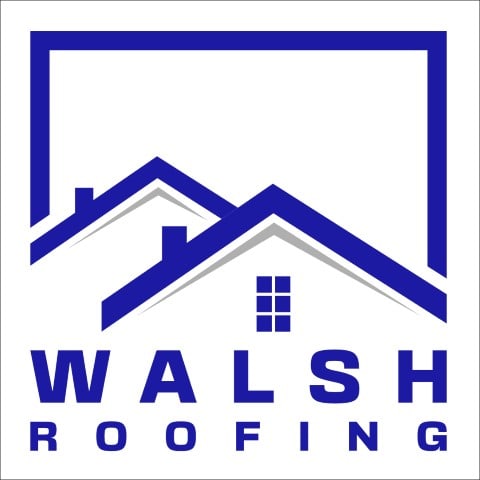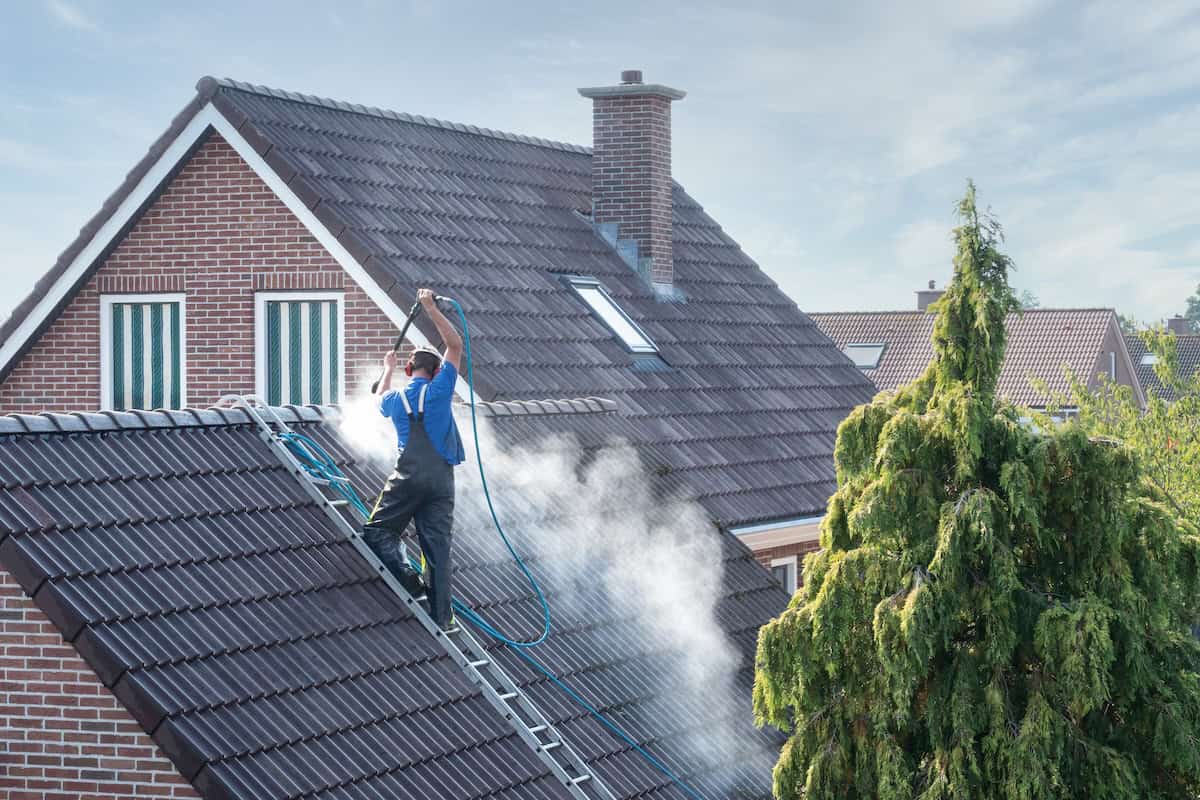Roof pressure washing is a topic that often sparks debate among homeowners looking to preserve or refresh their home’s curb appeal. When performed correctly by a reliable contractor, it can be a powerful cleaning technique, but there are important risks and precautions to be aware of before you decide to move forward.
Choosing the right way to approach roof pressure washing is a major decision that impacts your roof’s longevity, warranty, and overall appearance. While the promise of a perfectly clean roof is tempting, improperly using high-pressure water can cause significant and costly damage. This is why it’s essential to understand the difference between safe cleaning methods and risky DIY approaches. In this guide, we break down everything you need to know about roof pressure washing, so you can make an informed choice that protects both your home and your investment.
Let’s take a closer look at when roof pressure washing makes sense—and when it can do more harm than good.
Key Takeaways: Roof Pressure Washing
- Pros: Pressure washing can effectively remove dirt, debris, and organic growth, which restores your roof’s appearance and can prevent structural damage.
- Cons: The main risk is damaging your roof by dislodging protective granules or forcing water underneath shingles, which may also void your warranty. DIY attempts are not recommended due to these risks.
- Safer Alternatives: The article recommends soft washing, which uses low pressure and specialized solutions, as a safer, professional option.
- Professional Expertise: The page emphasizes that pressure washing is only suitable for certain durable materials like metal or clay tile and should only be performed by an experienced contractor.
Signs Your Roof Needs Professional Cleaning
Not sure if your roof needs a professional cleaning? It’s easy to overlook signs of wear and debris, but a simple visual check can tell you a lot. Look for these key indicators that it’s time for professional roof pressure washing.
- Dark Streaks or Stains: These are often caused by algae growth (specifically gloeocapsa magma), which feeds on the limestone filler in asphalt shingles. Over time, these dark streaks can break down the shingles and compromise your roof’s integrity.
- Moss, Lichen, or Mold: These organic growths retain moisture and can cause significant damage. Moss, in particular, can lift shingles, leaving your roof deck vulnerable to water intrusion.
- Visible Debris: An accumulation of leaves, pine needles, and other debris can trap moisture and clog gutters, leading to water pooling on your roof.
- General Discoloration: If your roof looks uniformly dark or discolored compared to when it was new, it may be covered in dirt and grime that a simple cleaning can remove, restoring your home’s curb appeal.
The Pros of Roof Pressure Washing
While pressure washing isn’t always ideal for every roof, there are some clear benefits when it’s done right.
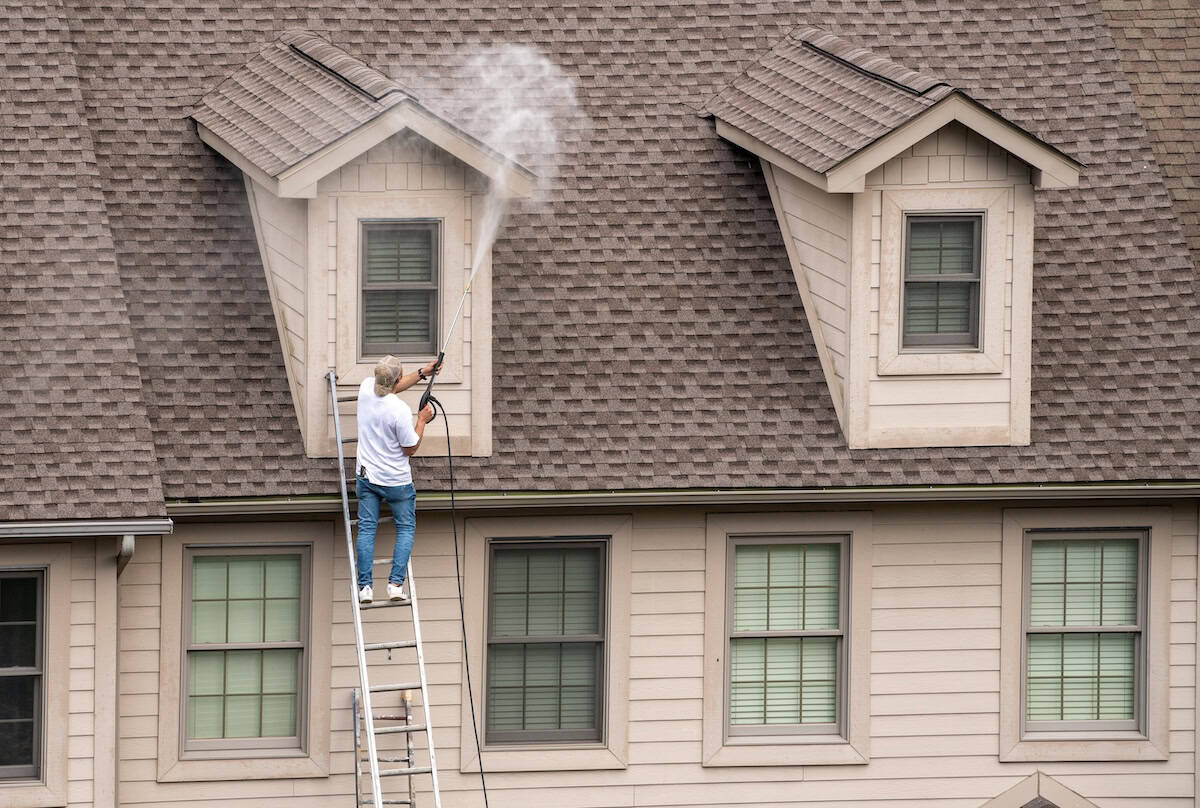
Removes Built-Up Debris and Contaminants
Leaves, moss, dirt, and even algae can accumulate on your roof over time. Roof pressure washing, in controlled environments, can:
- Clean away years of buildup
- Improve water drainage by clearing gutters and roof valleys
- Reduce the chance of water pooling and leaks
Restores Curb Appeal
A dirty roof makes your whole house look neglected. A freshly cleaned roof can:
- Brighten the look of your property
- Enhance property value if you’re planning to sell
- Complement other exterior updates, like siding and landscaping
Prevents Structural Deterioration
Left untreated, organic growth like moss can eat away at shingles. Pressure washing can:
- Halt moss and algae from degrading roofing materials
- Prevent rot and wood damage under shingles
- Extend the lifespan of your roofing system—if done correctly
The Cons of Roof Pressure Washing
Despite its appeal, roof pressure washing is not without drawbacks. In fact, improper use can create serious issues.
High Risk of Roof Damage
The biggest concern with roof pressure washing is damage to the roofing materials. Risks include:
- Dislodging or cracking shingles
- Forcing water underneath the roofing system
- Accelerating granule loss on asphalt shingles
Voiding Manufacturer Warranties
Many roofing manufacturers specifically state that pressure washing can void the product warranty. This includes:
- Asphalt shingles
- Cedar shakes
- Some composite materials
Safety Hazards for the Operator
Climbing on the roof with a pressure washer introduces risks beyond the surface damage:
- High water pressure can cause slips and falls
- Hose lines can tangle or drag, increasing fall risk
- Even professional roofers must take extra precautions with this method
Safer Alternatives to Pressure Washing
Not all roofs require the aggressive force of a pressure washer. Consider these safer alternatives.
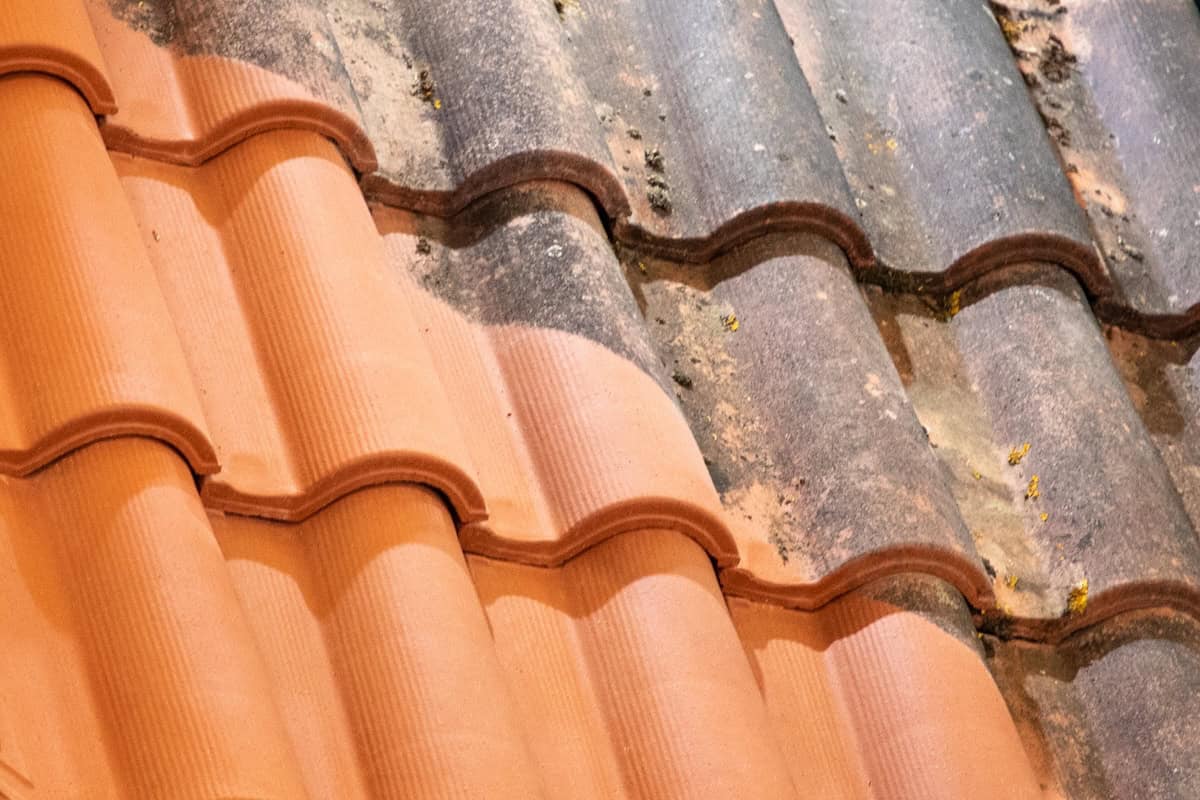
Soft Washing
Soft washing uses a low-pressure system with biodegradable detergents to break down algae, mildew, and grime.
- Gentler on shingles and seals
- Less risk of water intrusion
- Still achieves noticeable improvement in appearance
Manual Removal with Roof Brushes
For smaller sections or specific problem areas, roof brushes and mild cleaning solutions can be effective.
- Good for moss patches and gutter edges
- Allows for more precise control
- Reduces overall moisture exposure
Algaecide Treatments
Some homes benefit from the use of professional-grade algaecides:
- Prevents regrowth of moss and lichen
- Prolongs cleanliness without repeated washing
- Often bundled into maintenance contracts by roofing professionals
When Is Roof Pressure Washing Acceptable?
There are scenarios where roof pressure washing may be warranted, if done with strict precautions.
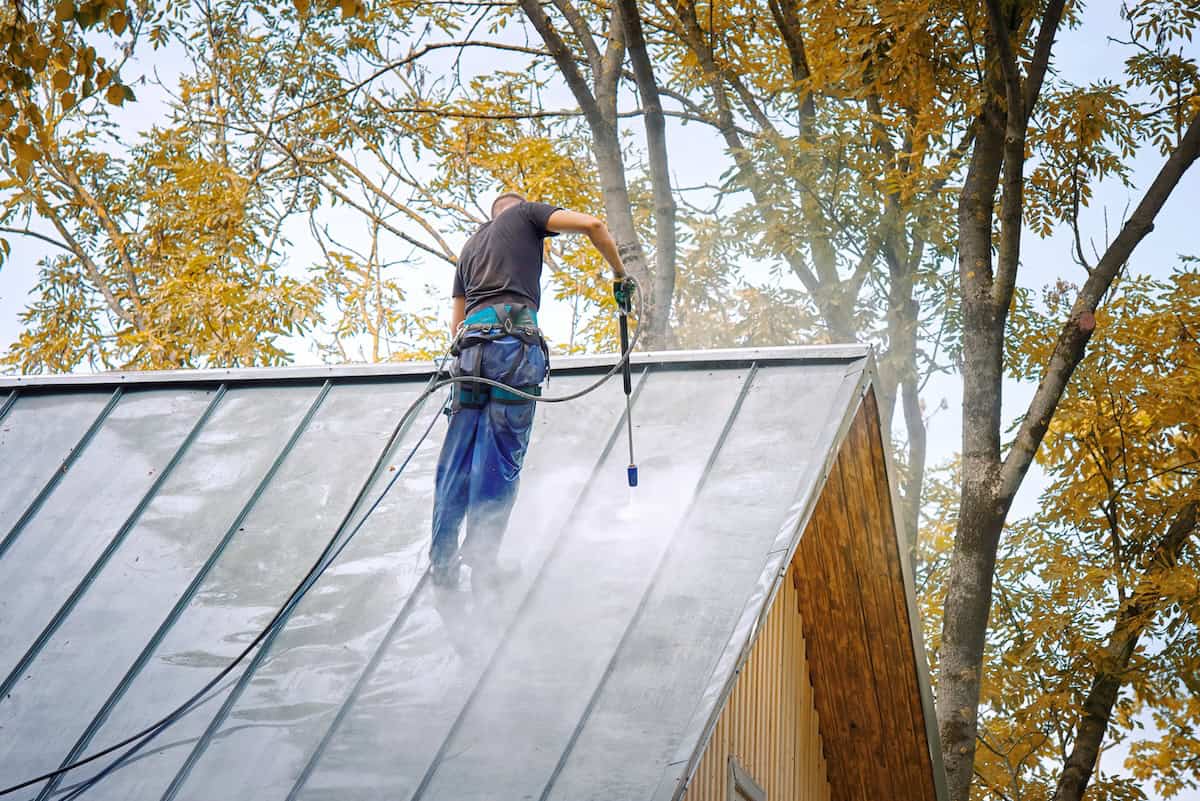
Roof Material Type
Some roofing materials handle roof pressure washing better than others:
- Metal roofs can typically withstand gentle pressure washing
- Clay or concrete tile may also hold up well with the right nozzle and angle
- Flat roofs with membrane coatings often benefit from light washing to remove debris
Equipment and Technique
Standard high-pressure nozzles are not suitable for roofs. The right setup includes:
- Wide spray pattern at low PSI (under 1,000)
- Adjustable tips to control direction and intensity
- Use of roof-safe cleaning agents to reduce pressure needs
Experience Level of Contractor
This is not a DIY job. Roof pressure washing needs specialized tools and professional labor:
- Licensed and insured roofers
- Technicians with roofing experience—not just general cleaners
- Teams with documented safety protocols for roof work
Roof Cleaning 5 Best Practices
When it comes to maintaining your roof, following these best practices ensures a clean result without long-term consequences:
1. Inspect the Roof Before Cleaning
Look for:
- Loose shingles or flashing
- Damaged gutters or soft spots
- Mold or pest infestations
2. Choose the Right Cleaning Method
- Soft washing is preferred for most asphalt shingle roofs
- Pressure washing should be considered only for suitable materials
- Match the technique to your roof’s age and structure
3. Use the Proper Equipment
- Low-pressure hoses and roof-safe detergents
- Harnesses, safety lines, and roof boots for operator security
- Plastic covers for landscaping protection
4. Clean on a Dry, Clear Day
- Avoid cleaning on windy or rainy days
- Morning is best to give the roof time to dry
- Helps prevent slipping and water saturation
5. Work with a Roofing Professional
- Look for roofers who offer roof presure washing packages
- Ensure the team specializes in roofing, not just exterior cleaning
- Ask for proof of insurance and project photos
What Goes into Professional Roof Pressure Washing Cost?
When considering the cost of professional roof cleaning, it’s important to understand that the final price is not a one-size-fits-all number. The fee for roof pressure washing is based on several key factors that directly impact the time, labor, and safety required for the job.
- Size and Pitch of the Roof: The most significant factor is the square footage of your roof, as this determines the amount of time and resources needed. Additionally, a steeper roof pitch requires specialized safety equipment and more labor, which will increase the cost of a professional roof cleaning project.
- Extent of Contamination: A roof with light algae streaks will be less expensive to clean than one with heavy, thick moss growth that requires a more intensive and time-consuming treatment plan. The level of dirt and organic debris is a major variable in the final price.
- Cleaning Method: Soft washing, which uses a specialized chemical solution, is a more complex process than simple high-pressure washing and may have a different price point, but it’s a safer, more effective option for most roofs.
- Accessibility: If the roof has complex angles, many obstacles like skylights, or is difficult to access, labor costs will be higher to ensure a safe and thorough job.
Why Walsh Roofing Is Your Trusted Roof Cleaning Partner
At Walsh Roofing, we understand that your roof is more than just shingles—it’s your home’s first line of defense. That’s why we take a cautious, knowledgeable approach to every roof cleaning project. Our crews are trained, certified, and fully insured. We back our work with a satisfaction guarantee and offer long-term maintenance programs to keep your roof in top condition year-round.
Professional cleaning is a critical part of a comprehensive maintenance plan, especially in humid climates where moss and algae thrive. When these growths are left untreated, they can compromise the integrity of your roofing materials and lead to expensive damage. To learn more about how to proactively protect your roof from these issues, read our post on Roof Moss Removal: Protect & Preserve Your Roof.
Don’t take risks with your roof. Contact Walsh Roofing today and see how we can restore your home’s appearance with our roofing solutions.
